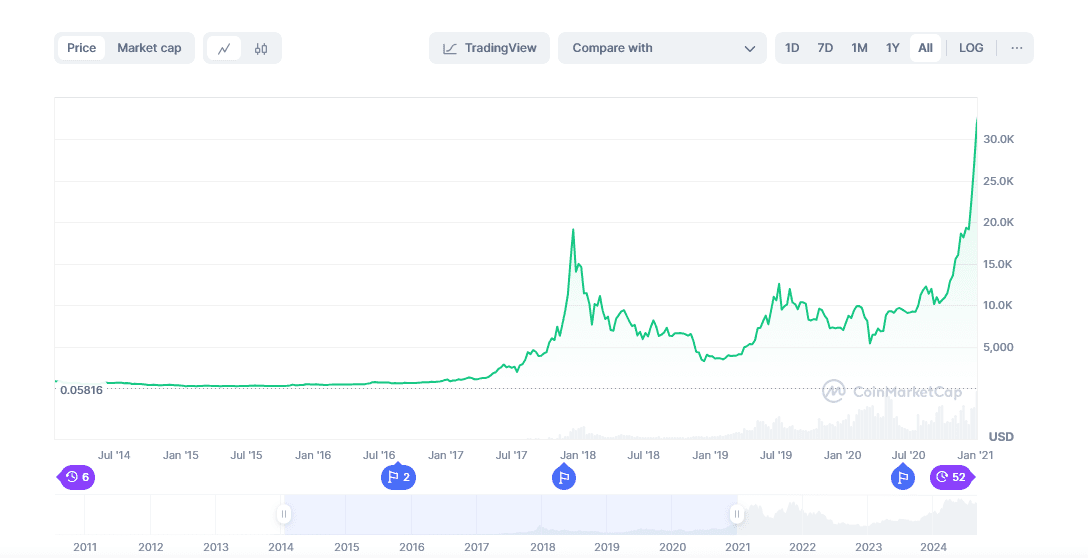Is It Time to Buy Bitcoin After Its All-Time High in 2020?
Only a decade ago, cryptocurrencies, also known as “cryptos,” were virtually unknown. Since the invention of the first crypto (Bitcoin) in 2008, thousands more cryptos have been developed. But Bitcoin, the original crypto, remains by far the most popular in today’s market and continues to set price records.
Bitcoin’s Recent Surge to an All-Time High in 2020
On December 31, 2020, Bitcoin (BTC) hit an all-time high of $28,993 per BTC – more than quadrupling in value over the course of 2020.
We hear regular pronouncements that insurance companies, hedge funds, and other institutional investors are piling into Bitcoin. Guggenheim Partners LLC, Paul Tudor Jones, and Stan Druckenmiller have all jumped on the Bitcoin bandwagon. Indeed, Guggenheim analyst Scott Minerd has suggested that Bitcoin’s real value could be as high as $400,000 per BTC. Insurance giant Massachusetts Mutual just announced a $100 million Bitcoin investment.
Free Wealth Protection Insights
Enter your email below to receive our weekly briefings on better ways to preserve your wealth, legally reduce your tax bill, and better protect what you’ve worked hard to build.
The Nestmann Group does not sell, rent or otherwise share your private details with third parties. Learn more about our privacy policy here.
PLEASE NOTE: This e-series will be delivered to you via email. You should receive your first message minutes after joining us. By signing up for this course, you’ll also start to receive our popular weekly publication, Nestmann’s Notes. If you don’t want to receive that, simply email or click the unsubscribe link found in every message.
Further highlighting Bitcoin’s growing mainstream acceptance, even PayPal is getting into the crypto space. However, as of the end of 2020, there’s not much you can do with your crypto on this platform.

Additionally, earlier in December 2020, Coinbase, the largest US-based crypto exchange, notified the Securities and Exchange Commission that it plans an initial public offering for its shares early next year. It will be the first major crypto-focused company to publicly offer shares.
Bitcoin as a Separate Asset Class?
Some financial analysts are now claiming that cryptos (especially Bitcoin) have matured into a separate asset class from stocks, bonds, and other traditional investments. At the same time, conventional stores of value, such as gold, haven’t kept up. Bloomberg Quint published an article on December 1, 2020, titled, “Bitcoin’s Rally Spurs Wall Street to Question Future of Gold,” pointing out that many investors are cashing in their gold exchange-traded funds holdings for Bitcoin.
Should You Sell Gold and Buy Bitcoin?
So should you sell gold and buy Bitcoin? And has Bitcoin suddenly surpassed traditional stores of value, such as gold?
We take a nuanced view on these matters. Bitcoin, and by extension other major cryptos such as Ethereum, are rapidly becoming mainstream investments. Yet, Bitcoin’s market capitalization is only 3% as large as gold.
As well, there were external factors affecting gold’s performance in November 2020. One reason traders sold gold during the month was due to the presidential election proceeding smoothly (even with Trump’s refusal to concede) and progress toward a vaccine for COVID-19. Also, in the third quarter of 2020, central banks became net sellers of gold for the first time in a decade.
Further, we’re generally reluctant to buy any asset when it’s trading at an all-time high. Bitcoin’s historical volatility, as shown in numerous price charts, indicates significant price swings over short periods.
The Case for Bitcoin
The main argument for buying Bitcoin is that its supply is limited. Because of the way that Bitcoin is designed, it is mathematically impossible for more than 21 million BTC to ever be created.
However, Bitcoin is only one of thousands of cryptos. The overall supply of cryptocurrencies is effectively unlimited, as anyone with the requisite mathematical knowledge can create their own crypto. Other than being smart, there are no substantial barriers to entry.
4 Reasons to Take Your Crypto Offshore
Discover how moving your crypto offshore gives you privacy, asset protection, and can even offer tax benefits.
Bitcoin’s Privacy and Regulatory Challenges
Bitcoin and similar cryptocurrencies with a ‘distributed ledger’ offer a crucial privacy advantage. Transactions occur peer-to-peer, eliminating the need for a middleman. There is no Bitcoin central authority. A Bitcoin transaction between you and your colleague in, say, Madagascar, involves only the two of you. All you need is some Bitcoin, a computer or smartphone, and an Internet connection.
It’s hardly a surprise that law enforcement authorities, central banks, and governments find this decentralized trading system threatening. They see the lack of a central authority in Bitcoin transactions as a potential loophole for illegal activities. Regulatory bodies have expressed concerns about the minimal oversight, citing risks related to money laundering and other unlawful activities.”
Thus, in 2019, the Financial Action Task Force on Money Laundering (FATF) urged a global crackdown on cryptos, which it calls “virtual currencies.” The FATF has developed “best practices” that will require countries to register virtual currency exchanges and custodians. These companies will be obligated to enforce the same detailed “know your customer” rules that traditional financial institutions such as banks are obliged to do.
Another far-reaching requirement is a so-called “travel rule” for every transfer of value in virtual currencies. Exchanges and custodians will be obligated to determine the beneficial owner of both the sender and recipient in any such transfer. They’ll also need to pass this information along to each other when transferring funds. If that’s too much trouble, and a country doesn’t want to deal with cryptocurrencies at all, the FATF guidance suggests they could be banned altogether.
The Rise of Stablecoins and Government-Backed Cryptos
As well, central banks and governments have indicated increased interest in cryptos linked to a fiat currency or a basket of fiat currencies – so-called “stablecoins.” The Federal Reserve, the European Central Bank, the Bank of England, and other central banks are exploring how stablecoins might fit into the currencies they oversee. And last April, the Chinese Central Bank formally launched a digital renminbi.
But the biggest advantage of stablecoins from the standpoint of central banks and governments is that cryptos tied to a fiat currency can be micro-managed. This capability allows central banks to have direct control over the stablecoin supply, making it possible to inject fiat money into the economy efficiently. Central bank cryptos can function literally as programmable money under whatever provisions the bank wishes to employ. This would allow Big Brother to decide how you’ll be allowed to spend your money and encourage or prohibit certain purchases or behavior.
Proceed with Caution
With these developments in mind, we think it’s a bit early to classify Bitcoin as its own asset class. While it has gained popularity and institutional interest, the landscape is rapidly evolving. Buy if you choose, but don’t be surprised if a combination of competition, stifling compliance rules, and government-backed stablecoins erode its popularity. Investors should remain cautious and keep an eye on regulatory developments and technological advancements that could impact Bitcoin’s future.
Need Help?
Since 1984, we’ve helped more than 15,000 customers and clients protect their wealth using proven, low-risk domestic and offshore planning. To see if our planning is right for you, please book in a consultation with one of our Associates. You can do that here.
Can You Buy Bitcoin in a Roth IRA? Tax Advantages, Risks, and How to Do It Correctly
Learn if you can buy Bitcoin in a Roth IRA, the tax benefits, potential risks, and how to set it up correctly for your retirement. Learn more here: Can you buy bitcoin in a Roth IRA.













